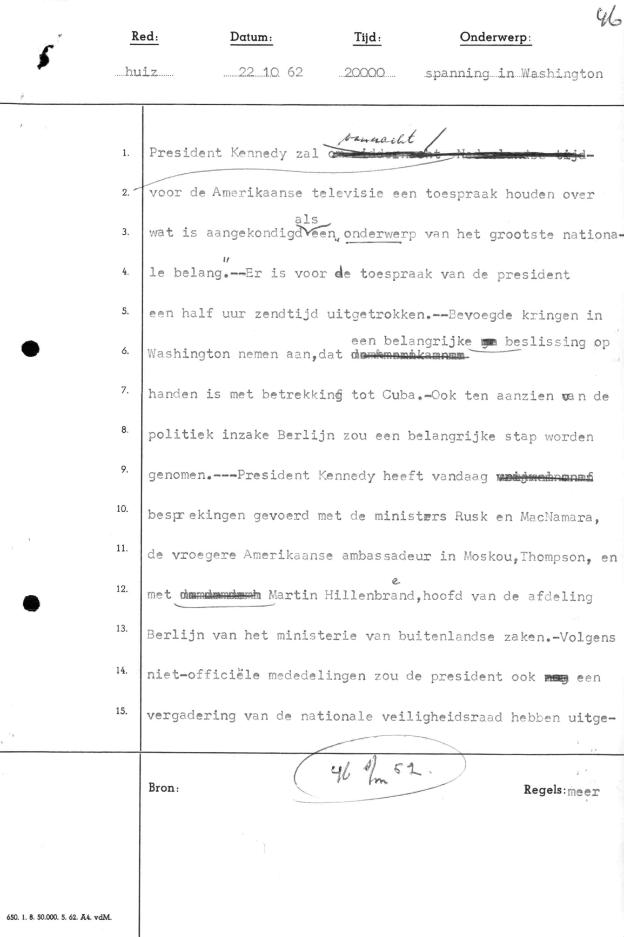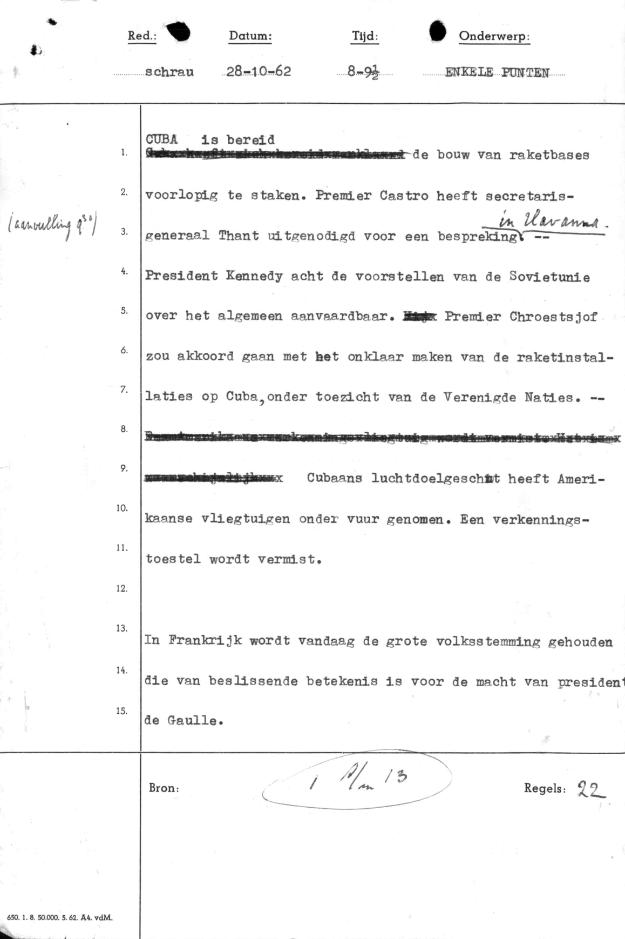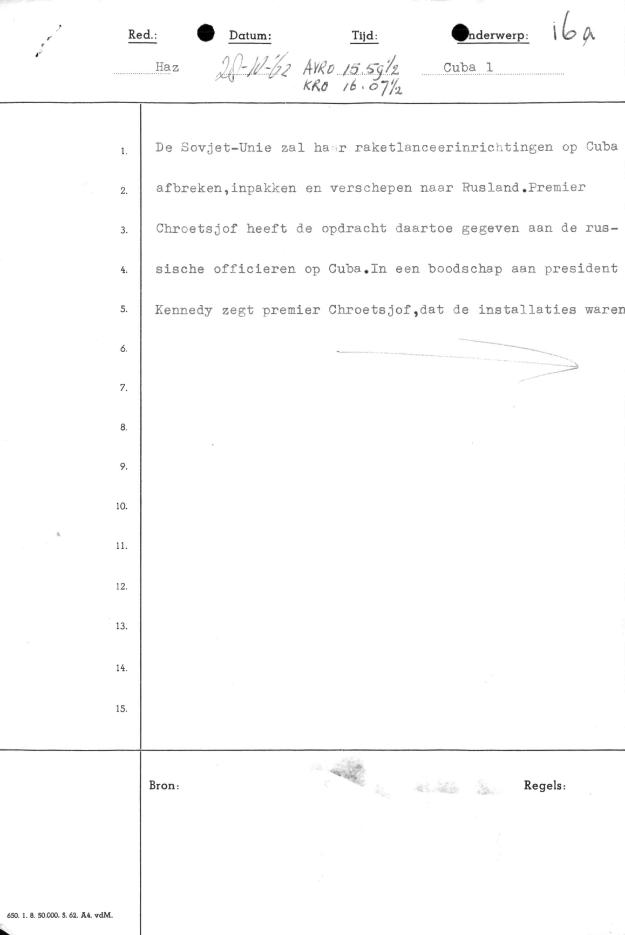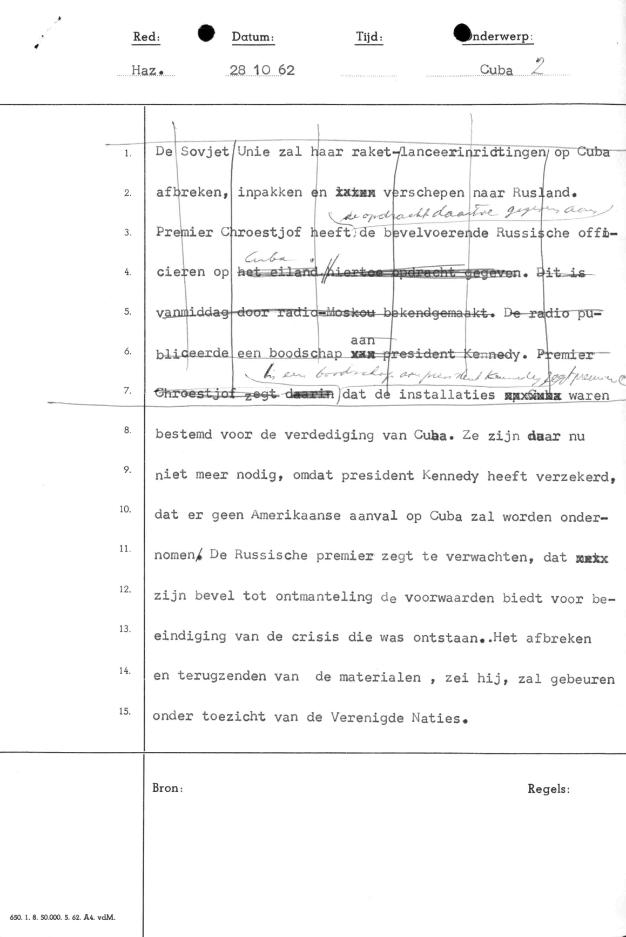Mediating the cold war
The cuban missile crisis on the airways
how the dutch heard the crisis through the radio
The Cuban Missile Crisis in 1962 was one of the moments the world came closest to nuclear war. For almost two weeks, the United States and the Soviet Union were negotiating themselves out of a potential nuclear confrontation. In the week that followed, people all around the world held their breath. This exhibition will guide you through the highlights of this week of Dutch radio broadcasting. This exhibition illuminates what people in the Netherlands knew at the time of the developments on the other side of the Atlantic concerning the Soviet missiles on Cuba.
Broadcasting the Cold War
In newspapers, and on television and radio, people were informed of the developments in the complex negotiations between the United States, the Soviet Union, Cuba, and the United Nations as mediator. The medium of television was on the rise and, mainly in the United States, replaced radio as the main source of news. In the Netherlands, radio was still the most used news device in households. At the time of the Cuban Missile Crisis, televisions were mostly used in public areas, like cafes. On Dutch public radio, the Algemeen Nederlands Persbureau (General Dutch News Agency) was responsible for the daily news broadcasts. Using ANP’s radio bulletins, this exhibition puts you on the spot of Dutch radio listeners and shows you what they heard on the last day of the crisis on the other side of the Atlantic on October 28, 1962.
These radio bulletins also give an insight into the workings of news broadcasting during the Cuban Missile Crisis. Important bulletins were apparently edited thoroughly, and in order to fix factual inaccuracies and find the right tone, you can see scribbled notes and even a whole rewritten section.
Kennedy’s speech of 22 October 1962
American intelligence already knew about the Soviet construction of missile facilities in Cuba for days, but on October 22 Kennedy used the media of television and radio to directly challenge the Soviet Union. Due to the difference in time zones, the Dutch radio bulletins could only report in the evening of October 22 that President Kennedy would make a statement “van het grootste nationale belang” (of the greatest national importance) later that night. For the Kennedy administration, the outcome of the Cuban Missile Crisis was of great importance, not just because of the threat of nuclear war but also because the US still had to deal with the Soviet Union in other conflicts, like Berlin. If Kennedy would have lost the crisis in Cuba, the US would lose a lot of face, making subsequent negotiations more difficult. Later, the political scientist Joseph S. Nye coined the term “soft power” to explain why and how the perception of power is just as important as military might.


Figure 1: ANP radio bulletin on Kennedy’s speech, broadcast on October 22, 1962, at 20:00. © Radio bulletin by the Algemeen Nederlands Persbureau, 22 October, 1962, “ANP Nieuwsbericht 64”, Accessed on 28 January, 2021, Delpher Online Archive. http://resolver.kb.nl/resolve?urn=anp:1962:10:22:64:mpeg21
Figure 2: The second page of the ANP radio bulletin on Kennedy’s speech. © Radio bulletin by the Algemeen Nederlands Persbureau, 22 October, 1962, “ANP Nieuwsbericht 65”, Accessed on 28 January, 2021, Delpher Online Archive. http://resolver.kb.nl/resolve?urn=anp:1962:10:22:65:mpeg21
The bulletins in Figure 1 and 2 show that the general contents of Kennedy’s speech were known before he addressed the world. The bulletin namely states: “Waarnemers in Washington menen, dat Kennedy een volledige blokkade van Cuba wil afkondigen” (Observers in Washington argue that Kennedy wants to issue a complete blockade of Cuba). The bulletin also links Kennedy’s speech to the issue of Berlin.
The threat of nuclear war

October 27 is generally regarded as the highpoint of the Cuban Missile Crisis. On this day, the ANP reported intensively on the missile crisis. Up to the last news bulletin – in figure 3 – on 23:55 in the evening of October 27, the broadcast reported that Kennedy was not willing to negotiate with Premier Khrushchev until the Soviets dismantled their missile installations. Dutch radio listeners thus went to bed still with the potential prospect of a further escalation of the conflict between the United States and the Soviet Union.
On the contrary, from this bulletin escalation seemed more probable. In figure 3, the US responded to a statement by the Cuban authorities that their anti-aircraft guns drove away unidentified planes: “Het ministerie van defensie in Washington heeft bekend gemaakt dat het onmiddelijk tegenmaatregelen zal nemen als amerikaanse vliegtuigen boven Cuba worden gehinderd” (The ministry of defense in Washington has declared that it will immediately issue countermeasures if American aircrafts are obstructed in Cuban airspace).
Figure 3: ANP Radio bulletin on Kennedy’s refusal to negotiate with Soviet Premier Khrushchev on the Cuban Missile Crisis. © Radio bulletin by the Algemeen Nederlands Persbureau, 27 October, 1962, “ANP Nieuwsbericht 86”, Accessed on 29 January, 2021, Delpher Online Archive. http://resolver.kb.nl/resolve?urn=anp:1962:10:27:86:mpeg21
Ending the Cuban Missile Crisis

The biggest news, however, was yet to break. On October 28, 1962, 16:00 in the afternoon, in figure 5, the ANP bulletin finally reported: “de Sovjet-Unie zal haar raketlanceerinrichtingen op Cuba afbreken, inpakken en verschepen naar Rusland.” (The Soviet Union will dismantle, pack, and ship their missile installations in Cuba back to Russia). Moreover, this bulletin – in figure 6 – ended fears for a war because “[…] president Kennedy heeft verzekerd, dat er geen Amerikaanse aanval op Cuba zal worden ondernomen” (President Kennedy has assured that there will be no American attack on Cuba).
This radio bulletin informed the Dutch listener that the direct nuclear threat of the Cuban Missile Crisis was over. Although the end of the crisis most definitely did not end the abysmal relationship between the United States and the Soviet Union, it did cool down the tensions between the two. A direct means of communication between the White House and the Kremlin, for instance, was established, something that has been depicted in popular media as a red phone. This way, American and Russian leaders can communicate in times of crisis, which is to prevent another hotheaded confrontation, like the one in late October, 1962.
Figure 5: ANP radio bulletin on Khrushchev’s decision to withdraw the Soviet missiles and equipment from Cuba. © Radio bulletin by the Algemeen Nederlands Persbureau, 27 October, 1962, “ANP Nieuwsbericht 25”, Accessed on 29 January, 2021, Delpher Online Archive. http://resolver.kb.nl/resolve?urn=anp:1962:10:28:25:mpeg21
Figure 6: Second page of the ANP radio bulletin on Khrushchev’s decision. © Radio bulletin by the Algemeen Nederlands Persbureau, 27 October, 1962, “ANP Nieuwsbericht 26”, Accessed on 29 January, 2021, Delpher Online Archive. http://resolver.kb.nl/resolve?urn=anp:1962:10:28:26:mpeg21
Bibliography
Brown, Seyom. Faces of Power: Constancy and Change in the United States Foreign Policy from Truman to Obama. New York: Columbia University Press, 2015.
Nye Jr., Joseph S. “Public Diplomacy and Soft Power.” the ANNALS of the American Academy of Political and Social Science 616, no. 1 (2008): 94-109.
The big news came on October 28. After days of tensed negotiations and global fears of an all-out nuclear confrontation between the United States and the Kennedy administrations, Dutch people woke up to the news that both Cuba and Khrushchev were prepared to stop the construction of the missile installations. This did not mean the Cuban Missile Crisis was over, but it took the pressure off.
In figure 4, it becomes clear that the Cuban statement a day before on their anti-aircraft activities seems to be true: an American reconnaissance aircraft has gone missing. Later it became known that an American plane was indeed shot down, drastically changing the confrontation between the United States and the Soviet Union.
The Cuban Missile Crisis was not the only news of the day, however. At the bottom of the bulletin, a French national referendum is mentioned. This referendum decided whether the French president could be elected directly or through an electoral college. The referendum ruled in favor of direct election, a decision that still stands.
Figure 4: ANP radio bulletin on the Cuban willingness to stop building the missile installations. © Radio bulletin by the Algemeen Nederlands Persbureau, 27 October, 1962, “ANP Nieuwsbericht 1”, Accessed on 29 January, 2021, Delpher Online Archive. http://resolver.kb.nl/resolve?urn=anp:1962:10:28:1:mpeg21

